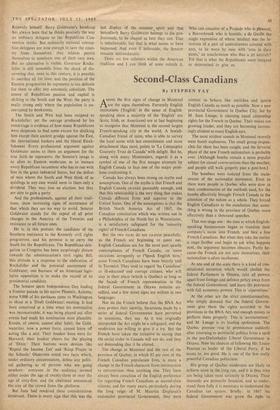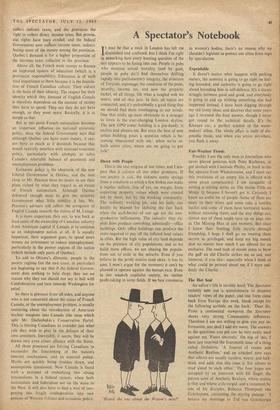Second-Class Canadians
By STEPHEN FAY A MONO the first signs of change in Montreal are the signs themselves. Fervently English institutions ('English' in the sense of English- speaking since a majority of the 'English' are Scots, Irish, or Americans) are at last beginning to recognise that Montreal is the second largest French-speaking city in the world. A Jewish- Canadian friend of mine, who is able to survey the local scene with less commitment and more detachment than most, points to `La Compagnie Guaranty Trust de Canada' with delight. But he, along with many Montrealers, regards it as a symbol of one of the first meagre attempts by English Canada to fae one of the major prob- lems confronting it.
Canada has always been strong on myths and assumptions. One of the myths is that French and English Canada co-exist peaceably enough, and that this relationship is the very thing that makes Canada different from and superior to the United States. One of the assumptions is that the British North America Act of 1867, the Canadian constitution which was written not in a Philadelphia of the North but in Westminster, is a satisfactory safeguard for the 'minority rights' of French Canadians.
But the two races do not co-exist peacefully, as the French are beginning to point out. English Canadians are for the most part quietly contemptuous of French Canada; on some occasions arrogantly so ('Speak English here,' some French Canadians have been bluntly told in Toronto). They tend to regard 'lea Canadiens' as ill-educated and corrupt citizens, who will stay in their place (which is Quebec) as long as the façade of French representation in the federal Government in Ottawa remains un- sullied, and a few street signs are written in two languages.
Nor do the French believe that the BNA Act does protect their identity. Incursions made by a series of federal Governments have perverted its intentions, they say. As it was originally interpreted the Act might be a safeguard, and the moderates are willing to give it a try. But the French have taken the initiative in saying that the social order in Canada will not do, and they are demanding that it be altered.
The change in Montreal and the rest of the province of Quebec, in which 85 per cent of the French Canadian population lives, is more a change in the French character from introversion to extroversion than anything else. They have always been conscious of the English preference for regarding French Canadians as second-class citizens, and for many years, particularly during the long reign of M. Maurice Duplessis's nationalist provincial Government, they were content to behave like ostriches and ignore English Canada as much as possible. Now a new provincial Government in Quebec City, led by M. Jean Lesage, is claiming equal citizenship rights for the French in Quebec. Their voices are growing louder, and they are becoming increas- ingly strident to many English ears.
The most strident sounds in Montreal recently were bomb explosions. The small group respon- sible for them has been caught, and the terrorist phase of the new French nationalism is probably over. (Although bombs remain a more popular subject for casual conversations than the weather, and people still walk gingerly past a post-box.) The bombers were isolated from the main- stream of the nationalist movement. Even so there were people in Quebec who were slow in their condemnation of the methods used, for the bombs effectively brought French Canada to the attention of the nation as a whole. They forced English Canadians to the conclusion that some- thing is wrong in the province of Quebec more effectively than a thousand speeches.
That was stage one: the time at which English- speaking businessmen began to translate their company's name into French, and hire a few French Canadians. But when they take the matter a stage further and begin to ask what happens next, the argument becomes obscure. Partly be- cause the French are not sure themselves; their nationalism is often incoherent.
At one end of the scale there is a kind of con- stitutional terrorism which would abolish the federal Parliament in Ottawa, take all powers apart from foreign and defence policy away from the federal Government, and leave the provinces with full economic powers. This is 'separatisme: At the other are the strict constitutionalists, who simply demand that the federal Govern- ment give them the rights accorded to the provinces in the BNA Act, and enough money to perform them properly. This is 'autonornisme: and M. Lesage is its leading spokesman. The Quebec premier rose to prominence suddenly after returning to provincial politics from a spell in the pre-Diefenbaker Liberal Government in Ottawa. Now his chances of following Mr. Lester Pearson as leader of the Liberal Party, if he wants to, are good. He is one of the few really powerful Canadian politicians.
His group of Quebec moderates are likely to achieve most in the long run, and it is they who are being taken most seriously in Ottawa. Their demands are primarily financial, and to under- stand them fully it is necessary to understand the Canadian tax system. Briefly: in 1867 the federal Government was given the right to collect indirect taxes, and the provinces the right to collect direct, income taxes. But provin- cial rights have been eroded, and the federal Government now collects income taxes, redistri- buting some of the money among the provinces. Quebec's demand is for a higher proportion of the incomes taxes collected in the province.
Above all, the French want money to finance an improved system of education (which is a provincial responsibility). Education is of such vital importance to them because it is the founda- tion of French Canadian culture. Their culture is the basis of their identity. The respect for their identity which they demand of English Canada is therefore dependent on the amount of money they have to spend. They say they do not have enough, so they want more. Basically, it is as simple as that.
But at this point French nationalism becomes an important influence on national economic policy, since the federal Government says that although Quebec can have more money, it can- not have as much as it demands because that would radically interfere with national economic policy, particularly with attempts to solve Canada's miserable balance of payments and unemplOyment problems.
Economic Polies, is the obsession of the new Liberal Government in Ottawa, and the men close to Mr. Pearson have no desire to see their plans ruined by what they regard as an excess of French nationalism. Although Quebec delivered enough seats to give the minority Government what little stability it has, Mr. Pearson's advisers still reflect the arrogance of English Canada towards the claims of M. Lesage.
It is more important, they say, to win back at least some of the ownership of Canadian industry from American capital if Canada is to continue as an independent nation at all. It is equally important, their argument goes, to spend more money on investment to reduce unemployment, particularly in the poorer regions of the nation (which include only parts of Quebec).
To add to Ottawa's dilemma, people in the poorer regions (on the east coast, in particular) are beginning to say that if the federal Govern- ment does nothing to help them, they see no reason why they too should not say to hell with Confederation and turn towards Washington for relief.
So there is pressure from all sides, and anyone who is not concerned about the status of French Canada, or the unemployment Problem, is usually muttering about the introduction of American nuclear weapons into Canada ((he issue which split Mr. Diefenbaket's Conservative Party). This is forcing Canadians to consider just what role they wish to play in the defence of their own continent. Inevitably, it seems, they will be drawn into even closer alliance with the States.
All these pressures are forcing Canadians to reconsider the functioning of the nation's internal mechanisms, and its external policy. Myths are quickly being trodden down, and assumptions questioned. Now Canada is faced with a prospect of embodying two strong nationalisms in a federal system, when both nationalism and federalism are on the wane in the West. It will also have to find a way of inte- grating this fragile confederation into new systems of Western 0.4ence and economic policy.



































 Previous page
Previous page